Slow Knowing Deep Learning
for Health-Justice
Healing Relationships (therapeutic space)
Live zoom session https://us02web.zoom.us/j/864197039833.30pm – 5pm UK time Meeting ID: 864 1970 3983 Passcode: 113544
Activity One
The Well Now 4 P’s Framework
This is something I use in training but it can be helpful to share with clients too. The text is from training materials for practitioners:
The 4 Ps can be useful for helping people structure their ideas as they learn to make links between personal ill/health, self-care, and social justice in everyday situations.
The ‘Four P’s’ refer to:
- personal
- peer
- political
- planet
It’s a way of keeping to the fore the way issues are inter-linked and influence us in different arenas of our lives. It can be a useful framing that steps people from a topic that feels personal and invites them to broaden it out to consider everyday relationships and structural and social (including ecological factors).
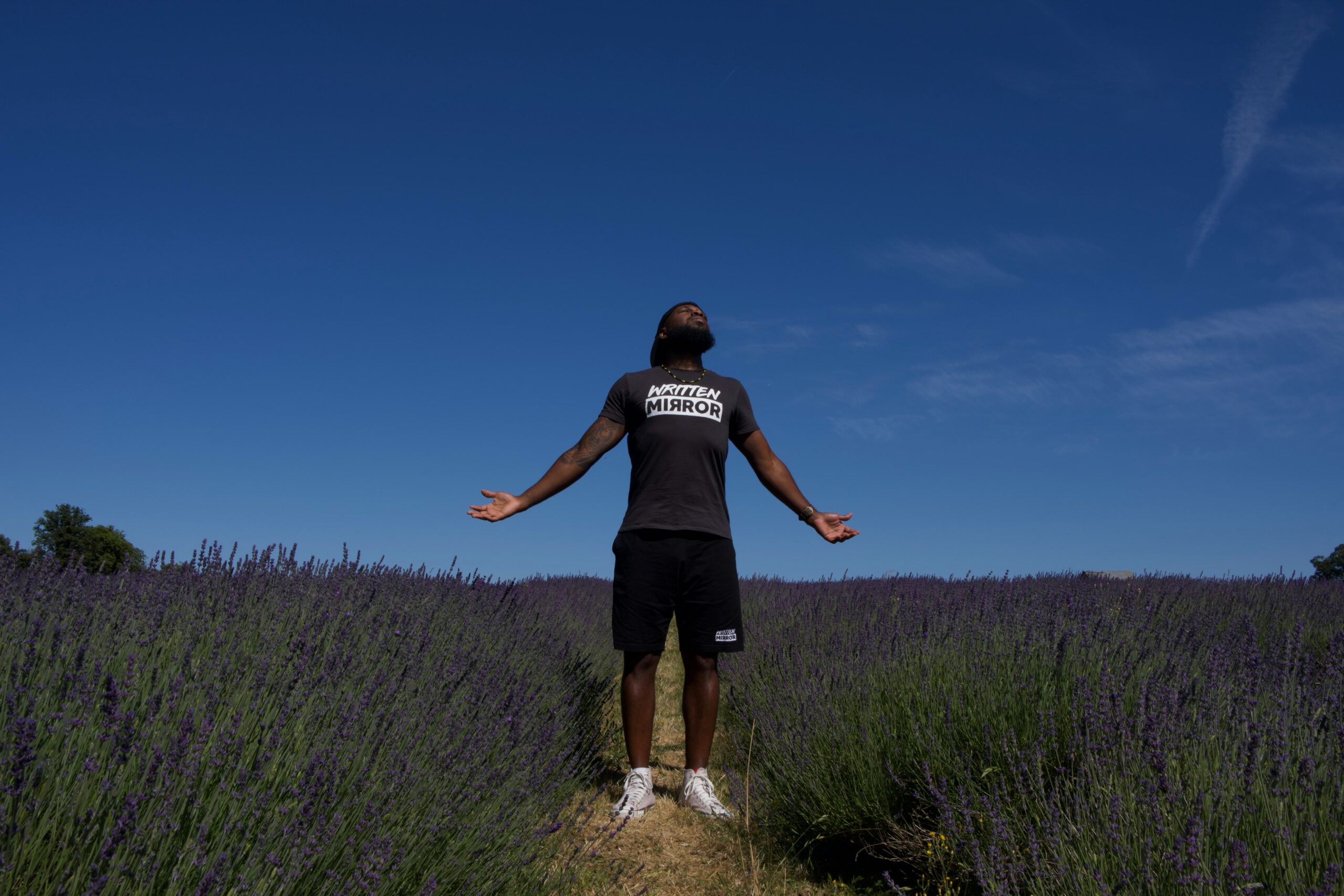
It means we name the impact of internal and external oppression. It prevents us from oversimplifying the experience of living with discrimination as we acknowledge the personal emotional cost and the real social disadvantages that occur when people are stigmatized.
It’s not always appropriate to mention the planet, but I think it’s useful to include it in the list.
|
You can sense the consternation in Ralph’s voice. He says that he gets that it’s not ok to be prejudiced about fat, and he’s been surprised to learn just how much stigma impacts people’s health – and the relatively minor impact of diet and activity. But, that aside, it seems to him that Well Now is ignoring the practical realities of living in a larger body. Take shopping for example, even once he’s braved the hostile glares on the bus he still has to contend with the shop assistant’s sneers or embarrassment and it’s just such an inconvenience not being able to walk into a high street shop to buy a T shirt.
Let’s start off by validating Ralph’s frustration and outrage at stigma, and ask if there’s anything he’s found useful to protect himself in the minute if he receives insults or stares, or as a response either to challenge the perpetrator (personal) or to nurture himself afterwards – is there someone he can speak to? (peer) It is deplorable that fat bias exists and that he is confronted by it every day (political awareness – he is not the problem, bias is, seen in people’s behaviour and policies that don’t allow larger sizes to be stocked). We would also acknowledge his lived reality, the practical frustration with shopping plus how it makes him feel like an outsider. Has he come across the fatshionista sites on the web? Are there any for men? Reiterate that discrimination is always wrong – we may find away to endure it, but ultimately we need to prevent it. |
Activity Two
Well Now Waymarkers

I like the idea of way markers as it suggests pointers that have kept others safe before us, but doesn’t suggest there’s only one way, or one best or fixed route.
I also like the pun that makes those using it ‘way fairers’ though I don’t indulge myself with it very often!
Here’s a Well Now Waymarkers diagram.
Activity Three
Deep Theory – A Queery of Everything
This is an excerpt from a Touchstone booklet I wrote for practitioners.
Well Now theory is geared towards supporting us relationally in everyday situations, rather than being something solely intended for therapeutic use. You could say it’s a way of training ourselves to be newly in relationship in, and with, the human and non-human world. Revisiting our thinking through an anti-oppressive framework can offer us a new relationship with food, our bodies, our emotions, knowledge, each other, the planet. If we imagine Well Now theory as a loom, the four outer frames are
- Our stories matter
- Compassion
- Curiosity
- Connection
Knowledge gets built up from three core threads of being relational, intentionally political and body aware. As the fabric or knitting starts to grow, we notice it has emergent patterns recognizable as being compassion-centred, trauma-informed and justice-enhancing. This approach to generating knowledge is obviously hugely relevant to public health, and when we’re working as practitioners the point of entry may well be self-compassion, identity, eating, body shame and related concerns. But it can also help us shape how we think, feel, act and relate beyond any arena of self-care and critical health promotion. It’s a Queery of Everything because it is grounded in the commitment to challenge the deep roots of oppression. Connected eating, realistic fitness, kindfulness and so on are how this commitment take shape to me when exploring food and movement. Well Now starts from anti-oppression and is shaped by the particulars of food and body concerns rather than beginning with food and body concerns and adapting existing theory to accommodate learning on anti-oppression.
The intent is not to ‘fix’ someone’s eating, but to explore a different way of being in the world. No unsolicited advice, no agenda of stopping someone dieting, of conquest and imposition, of ‘getting someone on message’, just the queery of everything in pursuit of peace, emancipation, justice, survival.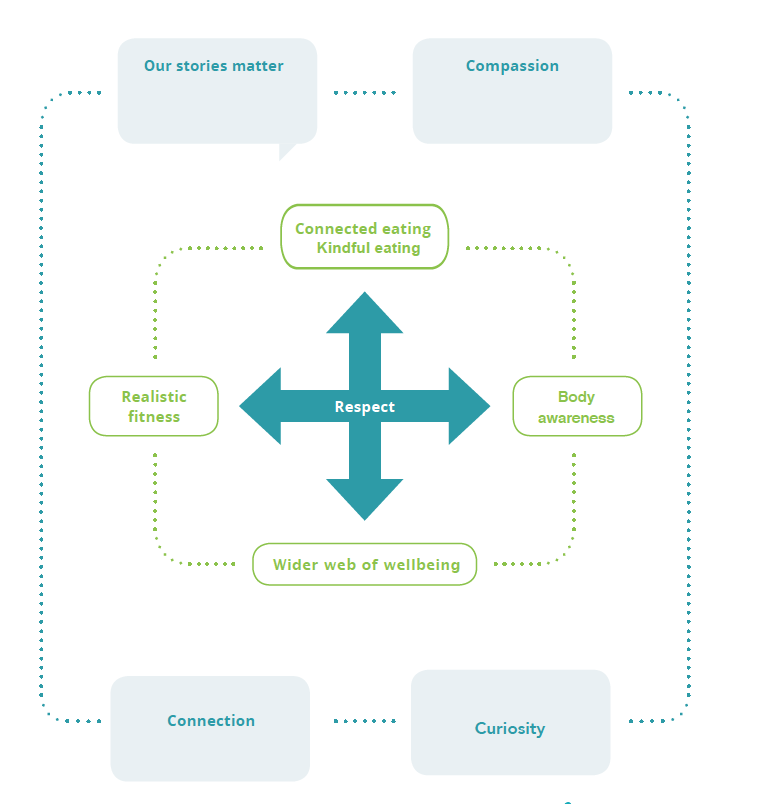
The entry point is food, bodies, health, but what we can learn from the conversation about thinking, context, self-worth, applies across the whole of our lives. I’m nottrying to chivvy or motivate anyone to do something I think they should be motivated to want to do. Remember, Well Now is about being with, not doing to.
The process that begins when we learn to think differently about food, health and bodies doesn’t stop at these boundaries, and changes the view/feel/take we get with everything. The underlying principles of Well Now are designed to help people – including us – shift from looking at food, and life, in ways that lead to judgement, shame and food confusion towards a way of being-with food, and life, that promote clarity and meaningful choice leading to (self) respect and social justice.
To repeat, in order to achieve this, it is theorized to be trauma-informed, compassion-centred and justice- enhancing. And hence is relational, body aware and intentionally political. In my dietetic work, the food conversation is the entry point, the goal of ending troubled eating is often the prompt, but finding peace with food could be considered a secondary outcome. Well Now is not intended as a ‘cure’ for eating problems. I know from my own experience that it is possible to be free from eating disorder symptoms and remain unaware that another whole other level of healing and realm of inter-connection and un/knowing is possible.
The overarching theory of Well Now, and within this, connected eating, is designed to help people find this healing and experience connection. My ambitions are that it offers us a new way of thinking- and being- in relationship, and so in the world, that is earth-honouring and liberatory.
So, rather than being an opportunity for primarily accumulating facts, Well Now training is about looking again at the deep assumptions that shape what we think we know. It’s about reorganizing our beliefs, an approach to knowledge creation that can impact heaps of things, including our sense of self and professional identity. My aim in the introductory training is to show how I think relationally through a Well Now lens and invite you to try it out. This handbook is here to help you ‘get yourself up to slow’, supporting you as you reorganize your practice, as feels fit, as you support others. It reflects all the Well Now values even as it represents only small part of the whole theory.
PS Here’s some text from the Untangling Table (from last week’s lesson) where I explain how to use it so it’s body aware, relational, and intentionally political.
Activity Four
Making Sense of Conflicted Eating
Here’s a link to a video on this topic.
It’s written for practitioners who are very new to the ideas. It’s teaching practitioners at the same time as suggesting how to work with clients, which means it will be a bit longwinded for your purposes, sorry. However, it gives you an idea of how we can layer in theory and practice that disturbs the deep roots of oppression while working in a 1:1
I sent a pdf of the slides by email.
These are key framings:
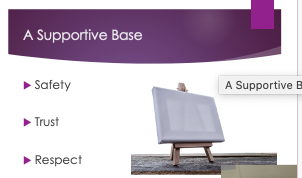 and then:
and then:
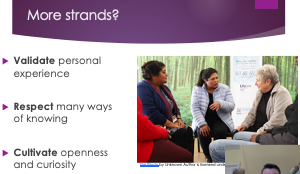
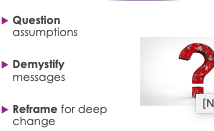
Activity Five
Recurring Themes and Concepts
I had a think about the themes and concepts that I refer to most regularly in 1:1 work and share them below.
I might paraphrase a concept eg. neoliberalism, rather than use the term. However, on the whole cludents (clients-as-students) are keen to build their knowledge and understanding of terms like this. If we’re circling round a topic that is relevant I might ask “have you come across the term xxxxx?” Generally people have heard of it and want me to explain what it means and how it connects.
These are some of the things I often draw on/in :
- Strengthening the compassion muscle – link to teach sheet.
- Many ways of knowing. Being a valid knower.
- Questioning the cultural idea of an expert/ academic authority.
- Sense of coherence. Salutogenesis. This is tied in with worthiness, meeting needs (which I tentatively extrapolate to wants, desires, pleasure).
- Noticing and changing binary thinking, and how this dis/connect links to safety and trauma.
- This year I started asking people if they’d like writing prompts like this.
- Neoliberalism – very often with the word delusion attached!
- The (capitalist) drive for productivity as a sign of human value.
- And of course systemic oppressions – fat bias, racism, anti-queerness, classism, ableism etc.
- The approach I use to counselling is that of radical trauma therapy (see reading in resources) and is aligned with critical adult education.
-
I often ask people about self expression/creativity, and spiritual practices or beliefs.
Activity Six
Listening for Dis/connect
Here’s another long winded video, it’s part one of a two part recording on listening for dis/connect.
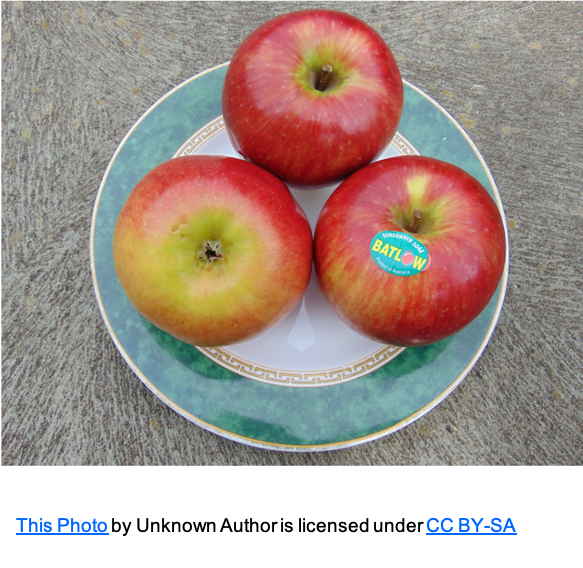
“If you know it’s long winded, why weren’t you more concise?” is a great question! Again, it’s written for people new to health-justice and I want to engage the listener in deep criticality. It gradually dawned on me that what feels like unnecessary repetition to me, actually helps people get a feel for new ideas in a way that allows the learning to sink in. Whereas saying it the once, in one way, means people are able to repeat it and may believe they have grasped it, but in fact it’s an intellectual knowing only, not a more useful visceral knowing.
Activity Seven
Resources and Pointers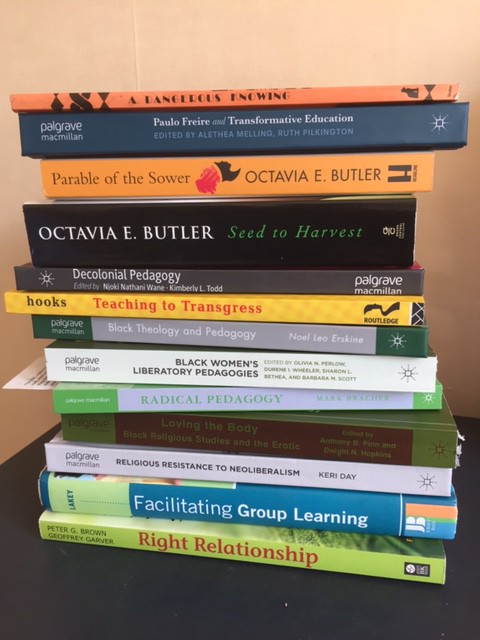
- Creative and Imaginative Learning/Brain Friendly Learning. There are some useful ideas here, especially for working with groups in person. Link to lots of training resources
(As with anything that feels like radical newness, I think there’s a danger that the innovative potential of the method can deflect us from paying due attention to problematic messages or systems).
- Radical Trauma article by Bonnie Burstow
-
Theorizing health at every size as a relational–cultural endeavour. I think this relational-cultural theory is really useful, and we make some great points in our article. But I don’t think it’s HAES we’re theorizing, do you?
- A gentle reminder to check in your body and maybe stroke the or have a or step outside for some
